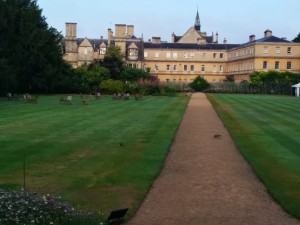Although I haven’t written much about it, today started as usual: an early morning run, a right English breakfast, and too much weird, decaffeinated, instant coffee from a canister that I bought from Tesco as to not bother our hosts everyday for decaf.
We heard first from Rebecca Eynon and her work conceptualizing learning and interaction in MOOCs. MOOCs add a new complexity to higher education, but we cannot forget the history and work that has been done in this field–many of the traditional work regarding education still applies in these digital spaces. Rebecca and her team were trying to develop profiles of the online learners that reflect how interaction happens. They then want to take these profiles and understand how interaction is related to learner progress and course outcomes. Rebecca took three steps to produce an interesting study. First, she conducted a network analysis and found that forums harbor crowds, not necessarily communities of learners. She also found, however, that certain sub forums do seem very important for some participants’ learning. Next, she completed qualitative interviews with 30 participants and found that there were four emergent themes: problem-solving, professional profiling, lifelong learning, and connecting and formal accreditation. Finally, she conducted a content analysis of 6500 forum posts. Within each post she and her team coded for knowledge construction, communicative intent, emotion, topic, and relevance. Their work is still on-going; they are finding it hard to agree on “valid” data since there are so many moving parts in the MOOC world. However, I found her research to be extremely interesting, thorough, timely, and practical.
After a coffee break (more weird decaf), Joss Wright spoke about his work on global censorship analysis. Focusing on China’s Golden Shield, Joss wants to understand not only country censorship, but also more localized filtering. He spoke about the different types of censoring: DNS poisoning, IP header filtering, IP content filtering, proxy filtering and the different ways of researching these methods: user reports, direct investigation, automated testing, and remote analysis. What I found intriguing about Joss’ talk was his discussion on the legality and ethical questions surrounding accessing blocked websites. Judging if a site should be blocked is often purely cultural and contextual. In the states and UK, we believe it to make perfect sense that child pornography sites are blocked. In other countries, perhaps it seems just as valid to block sites regarding gay rights. In other words, there are some sites that are blocked for serious legal and societal reasons. Therefore, accessing them could lead to negative consequences.
After a delicious Lebanese feast lunch (the best lunch yet!), our first SDPer presentation was from Emma Dahlin. Her research focuses on conceptualizing audiences–what is an online audience?!?! Using the ANT perspective (which researchers use to investigate how humans and technologies interact), Emma employed ethnographic and praxiographic methods to study the practices of an online audience discussing Dr. Who. Emma is in the early stages of her dissertation, and I found her aspiration to create a new definition inspiring–I understand the pain of trying to introduce a new definition!!
Next, Azar Eftekhar presented her dissertation research on how individual influences influence visual presentations on Facebook. Azar is in the cyberpsychology field and used The Big Five scale to compare personality with photos posted. After much survey collection and photo coding, Azar concluded that certain personality types exhibit different practices online. She also argued that her findings are in line with the main tenants of uses and gratifications theory in that Facebookers use the platform to play out their personality traits. Of course I have much to say about this study. It is very close to the work that I do with visual culture, anti-anonymity, and social networking sites. However, it is also quite different in its reliance on quantitative methods and uses and gratifications theory. I enjoyed Azar’s presentation, but I also could write a whole blog post just on my conflicting thoughts. (I just may!) 
Finally, Meryl Alper presented her dissertation work on Augmentative and Alternative Communication (AAC). As Meryl explained, these are devices that give “voice” to those that cannot speak (think Stephen Hawking’s talking device). She is particularly interested in children ages 3-13 and interviewed the parents of 20 kids to understand how communication and technology plays a role in their lives. I should include that they are all using a semi-expensive app on an iPad that allows them to have a “voice.” As early findings, she noted that parents talk a lot about the case. However, her findings are different than those who write about a case being a fashion accessory or a status marker. Instead, children need cases to be of a certain type–perhaps to more easily carry the iPad or to keep it stable on a table. Additionally, how a school system (who has issued the device to a student) cases the device speaks to how they feel about the child. Although short on time, she also mentioned the dichotomy of families who speak of communication vs. fun and communication as fun.
Today there was much more critical discussion from audience members. I am excited because I think that people are finally getting comfortable enough to critique work to all of our benefit! But, I am also a bit nervous since I have yet to present, and I know that my new ways at looking at issues (in particular anonymity vs. privacy) will possibly enact a, I’ll call it “lively,” debate.
I decided on an early night with some SDPer comrades, and had amazing pie, cookies, and Spanish peaches from The Covered Market.

“Matador” pie with gravy and minty mushy peas!
::drool::
Love you Pieminister …you evil, evil, place …
